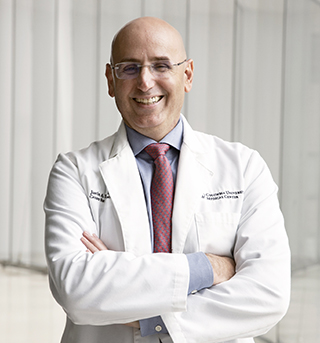Inside NYP: Dr. Nir Uriel
Renowned cardiologist returns to NYP to expand access to expert care for heart failure patients.

I knew from a young age that I wanted to be a doctor. I was always attracted to the field of medicine. It is my passion to help people. I see it as my place in the circle of life: to be there for people in times of need.
Growing up in Israel, you’re supposed to go into the army. I was offered a spot in medical school prior to the army and finished med school when I was 24. Then I joined the army as a combat battalion physician and then as a clinical study supervisor in the army’s medical research corps. I completed my residency and a cardiology fellowship in Israel, and moved to New York in 2008 for additional training at NewYork-Presbyterian/Columbia University Irving Medical Center.
I knew very little about advanced heart failure and transplant before my training at NewYork-Presbyterian/Columbia, one of the largest, most experienced heart transplant centers in the world. This is where I found my calling: helping people with advanced heart failure who may have been told they had no other options.
Heart failure is an epidemic; there are nearly 6 million people in the United States with heart failure. And the problem is that not everyone recognizes they are suffering from this condition, and not all patients receive the level of care that they require. There are a lot of options today that can change people’s lives: improve their quality of life, increase their longevity and give them another holiday to celebrate with their family, another year to see their grandchildren or children and spouses, and enjoy life.
This is where I found my calling: helping people with advanced heart failure who may have been told they had no other options.
Dr. Nir Uriel
This is why I am so excited to be returning to my roots at NewYork-Presbyterian to oversee the growing advanced heart failure and cardiac transplantation program across the enterprise, partnering with Columbia and Weill Cornell Medicine to reach as many patients with heart failure as possible and save as many lives as we can.
We want to do something special and increase the accessibility of care to all the people with heart failure in the area. People who come to NewYork-Presbyterian will have an easier pathway to reach advanced heart failure care if they require it, and people who have a less advanced condition will be able to benefit from new technology that is available. We can offer remote patient monitoring, along with new medications and lifestyle modifications that allow us to help patients live a good life with their heart failure disease and significantly reduce hospital readmissions. There are so many aspects, from medication to new medical devices, to heart replacement therapy that will now be more accessible to people in the New York area.
Following my training, I worked at NewYork-Presbyterian and Columbia as an attending cardiologist and researcher. It was a privilege to take care of so many patients, and see the effect you have on their lives. It was here that I learned the importance of a team effort in this field. We did several multi-organ transplants, and you need to work as one for success. It’s like a relay, one passing the baton to another. And my colleagues became a second family.
So it was bittersweet when I left for University of Chicago Medicine a little more than five years ago to lead their heart failure, transplant, and mechanical circulatory support program. But I wanted to challenge myself. My longtime mentor and friend, Dr. Allan Schwartz, chief of the Division of Cardiology at NewYork-Presbyterian/Columbia University Irving Medical Center, supported my decision but said, “You’ll be back.”

Dr. Nir Uriel
I am proud of the program we built in Chicago, where we helped so many people — thanks to the tools I learned here — including saving two lives at the end of last year with back-to-back triple-organ transplants within 27 hours, a first in U.S. healthcare history. One of the patients, Sarah, was a 29-year-old woman who came to my office after multiple institutions told her she needed to go to hospice. I didn’t think so and said, “We’re going to try to do everything we can.” Sarah’s liver and kidney were destroyed by her heart failure, so she required a heart, liver, and kidney transplant. My team and I believed, “We can help patients even if they’re so sick.” While Sarah waited for her triple-organ transplant, a young guy, Daru — also 29 — was admitted with multiple organ failure. Everybody thought he was going to die. He had sarcoid disease, an inflammatory disease that affects multiple organs, and needed a triple-organ transplant. We were already in the mindset that we were ready to transplant Sarah, so we were going to help him too. Two days before Christmas, we did the triple-organ transplant for Daru, and while he was still in the operating room, matching organs came for Sarah. We accepted the offer and both patients received a heart, liver, and kidney before Christmas.
When Dr. Schwartz called me last November, shortly before the triple-organ transplant, I was doing clinical rounds. Dr. Schwartz has been a guiding force in my career, so whenever I see a call from him, I answer. I stepped into a quiet area. He said, “You’ve built a great program there, but it’s time to come home.” I knew he was right. It’s always hard to leave something you’ve built, but I believe that by returning to NewYork-Presbyterian I can have an even bigger impact and help many more patients and do something special here.
We began discussing our vision for enhancing and expanding the advanced heart failure and cardiac transplantation program at NewYork-Presbyterian. What amazed me when working here the first time is how NewYork-Presbyterian truly puts patients first. It’s all about the patients and what we can do to help them. It is wonderful to be back, the team has been so welcoming, including Dr. Bruce Lerman, chief of the Division of Cardiology and director of the Cardiac Electrophysiology Laboratory at NewYork-Presbyterian/Weill Cornell Medical Center and Weill Cornell Medicine, who also encouraged me to come back to NewYork-Presbyterian to continue my work and help build the heart failure program across the system.
Throughout my career, I have pushed the envelope to try to help patients. When you sit in front of a patient, you think of all the ways you can help them. Translational and clinical research — taking what you learn in the lab and applying it to medical problems — is one of the most important ways to make advances in the field of heart failure.
One of the aspects of research I’m doing with my team is to understand how we can improve the quality of life for those who need mechanical circulatory support — devices that help your heart function when it is not working at its best, including ventricular assist devices (VADs). When we implant these devices, we are creating something that is hybrid, half human and half machine, and this interaction between the machine and the human body, specifically in how it affects the blood, can be challenging. We have been studying and advancing ways to improve quality of life for patients who require these devices. My team and I slowly built a medical algorithm to advise how to treat these patients so the body will not be bothered so much by the presence of mechanical components inside of it. Our research focuses on the compatibility between the pump and the blood, and the potential adverse events associated with the technology and how to resolve them. As a result, I had the opportunity to be one of the national principal investigators of the biggest mechanical circulatory support study in history, MOMENTUM 3, which really changed the way patients receive therapy with mechanical support.
Side by side, I continue to study heart transplantation in general and high-risk heart transplant specifically. Heart transplant in HIV patients was the topic of one of my first papers, and it remains one of my biggest passions. Historically, HIV patients were excluded from heart transplantation when they reached the phase in which the heart was failing. But we started transplanting patients with HIV and learned that we can do it as successfully as those without it. Pooling our research, we published a few papers and were very proud that this helped change the guidelines. Today, HIV is not a contraindication to transplant anymore. We still call these patients high risk, but it’s something that we can do and help those patients.
Heart transplant is magical. The improvement to quality of life after heart transplant is amazing. And what I find even more amazing is the concept that people who just lost a loved one can help someone else. In their death, a person can help and cure another person.
You always want to be able to help your patient. You don’t want to say, “This is the end of the road.” Of course, there are patients you will not be able to help. But before we say no to someone, I think we always have to ask ourselves, are we really unable to help them?
I feel that it is the biggest privilege to help people in need. This is the thing that is most important — this is a person’s life.
Dr. Nir Uriel is the director of advanced heart failure and cardiac transplantation at NewYork-Presbyterian, a professor of medicine in the Division of Cardiology at Columbia University Vagelos College of Physicians and Surgeons and an adjunct professor of medicine in the Division of Cardiology at Weill Cornell Medicine. He is a renowned leader in the field of heart failure, mechanical circulatory support, and heart transplantation, and his clinical and research breakthroughs have informed patient care around the world.
